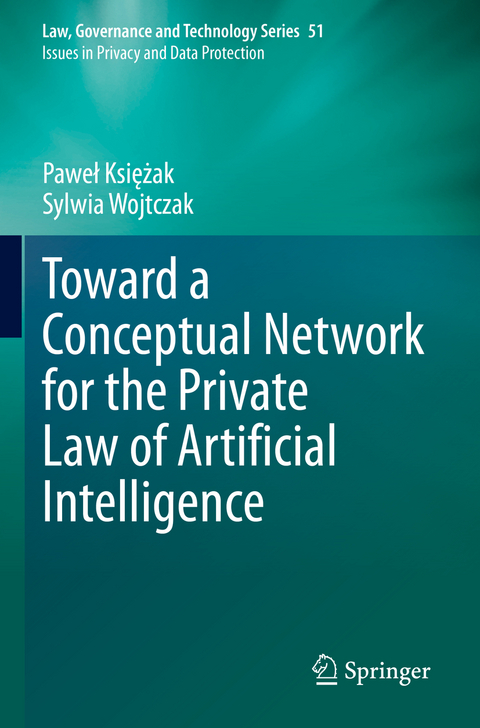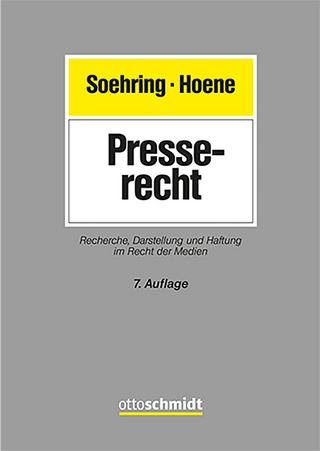
Toward a Conceptual Network for the Private Law of Artificial Intelligence
Springer International Publishing (Verlag)
978-3-031-19449-8 (ISBN)
The rise and expansion of Artificial Intelligence and robotics in recent years has highlighted a pressing need to create a suitable legal framework for this new phenomenon. The debate on the subject, although wide-ranging and involving many new legal documents, is still quite general and preliminary in nature, although these preparatory works illustrate the very real need to develop appropriate new civil law arrangements. It is exactly the branch of private law where the necessity of these new rules appears to be the most imperative. Autonomous vehicles, medical robots, and expertise software raise fundamental questions on aspects of civil liability such as culpability; whereas the growth in popularity of automated, intelligent software systems for concluding contracts requires a new approach to many fundamental and deeply rooted elements of contract law, e.g. consciousness, intent, error, deception, interpretation of contracts and good faith. Ruling on these specific matters demands the identification and clarification of certain key points, which shall become the foundation for constructing AI/robot civil law.
Pawel Ksiezak, PhD and dr. hab., Associate Professor at the Civil Law Department at the University of Lodz, Poland; a solicitor for many years, at the present time the judge of the Supreme Court in Poland. His main research interests are, among others, personal goods, unjust enrichment, liability for damage and inheritance law. He published four scientific monographs and dozens of scientific papers on civil law. He co-authored two commentaries on the Polish civil code. He is the principal investigator in the research project concerning civil law of robotics and AI, financed by the National Science Centre, Poland.
Sylwia Wojtczak is a lawyer, legal philosopher and legal theorist; PhD and dr hab., full professor, works at the University of Lodz, Poland. Her main research interests are legal axiology and the problem of legal cognition and reasoning. She is co-author and author of scientific papers and books, among others "The Metaphorical Engine of Legal Reasoning and Legal Interpretation" (C.H. Beck, Warszawa 2017). She was the principal investigator in the research project on the application of the cognitive theory of conceptual metaphor for analysing the legal language. Now she is the investigator in the research project concerning civil law of robotics and AI, financed by the National Science Centre, Poland.
Introduction - is a new conceptual network necessary to adapt the civil (private) law to the development of AI and robotics development?.- Artificial Intelligence and legal subjectivity.- Will and Discernment.- Capacity for juridical acts.- Consent.- Personal interests of AI.- Copyright.- Property.- Contract.- Abuse of right.- Liability of AI.- Conclusions.
| Erscheinungsdatum | 17.01.2024 |
|---|---|
| Reihe/Serie | Issues in Privacy and Data Protection | Law, Governance and Technology Series |
| Zusatzinfo | VIII, 296 p. 1 illus. |
| Verlagsort | Cham |
| Sprache | englisch |
| Maße | 155 x 235 mm |
| Gewicht | 468 g |
| Themenwelt | Recht / Steuern ► Öffentliches Recht |
| Recht / Steuern ► Privatrecht / Bürgerliches Recht ► Medienrecht | |
| Schlagworte | Abuse of rights • AI • Artificial Intelligence • attribution and liability • causality in private law • Civil Law • Computer Technologies • consent • fault and negligence • Legal Personality • Legal Personhood • legal theory • Personal goods • Robotics • robots • standard of reasonable care |
| ISBN-10 | 3-031-19449-7 / 3031194497 |
| ISBN-13 | 978-3-031-19449-8 / 9783031194498 |
| Zustand | Neuware |
| Haben Sie eine Frage zum Produkt? |
aus dem Bereich


